I’ve had incredible luck with my book choices lately: in the last month I’ve read more 4.5 and 5-star books than I sometimes read in an entire year! None of those books are in today’s roundup—you’ll have to wait for Parts Two and Three of this month’s Quick Lit for those—but today’s batch does contain five strong titles with compelling stories and ideas.
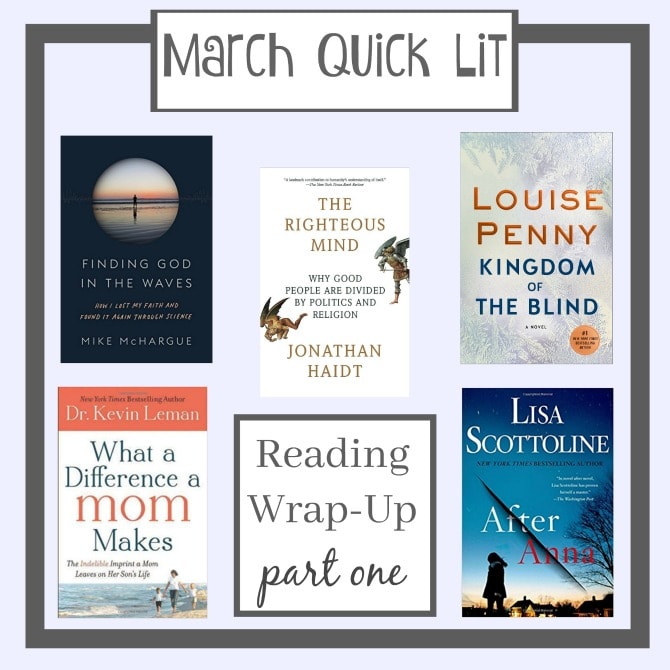
The Righteous Mind: Why Good People Are Divided by Politics and Religion, by Jonathan Haidt: In our increasingly polarized social and political climate, it’s easy to attribute differences in the “other side” to moral shortcomings, irrationality, or both. In this fascinating book about psychology, morality, politics, and religion, research psychologist Jonathan Haidt attempts to bridge the divide by helping humanity understand itself.
The book, which is research-heavy but accessible and insightful, is divided into three parts: Part One explores the concept of social intuitionism (the idea that our morality is instinctive rather than rational); Part Two examines the origins of morality; and Part Three takes a look at the ways our morality binds societies and sub-cultures together, and how it can blind us from seeing truths and commonalities in people who hold opposing views. Haidt provides definitions for liberalism, conservatism, and libertarianism, then explains why each group has different definitions of right and wrong, and highlights the positives and negatives of each perspective.
I am infinitely fascinated by psychology, philosophy, and group dynamics, so this book was right up my alley. The book is dense, rich with jaw-dropping insights and dozens of new concepts that I’d like to explore further. I listened through the audiobook twice, from start to finish, and learned even more the second time through. Haidt is a liberal atheist, so he and I come to these concepts from opposite perspectives, and there was quite a bit that I disagreed with (especially his thoughts on evolution and his disregard for moral absolutes); there are a few ideas he spends whole chapters attempting to explain that for me (because of my Christian faith) have easy answers. However, these differences made this an even more intriguing and thought-provoking read (and consequently helped to solidify the beliefs Haidt attempted to dispel).
I found Haidt’s discussion of politics much more compelling—and necessary—than his thoughts on religion. I appreciated his clarification of the various political viewpoints, their origins, and what each perspective brings to the table today. He treats this delicate topic with fairness, rationality, and a respect for differing ideas that is also not afraid to point out each political group’s shortcomings.
I didn’t like this book quite as much as The Coddling of the American Mind, and I’m glad that I read that one first as it predisposed me to like this one (which I otherwise might have set down after the first few rather shocking chapters). Go into this one with an open mind, and be prepared to have that mind blown.
My Rating: 4 Stars
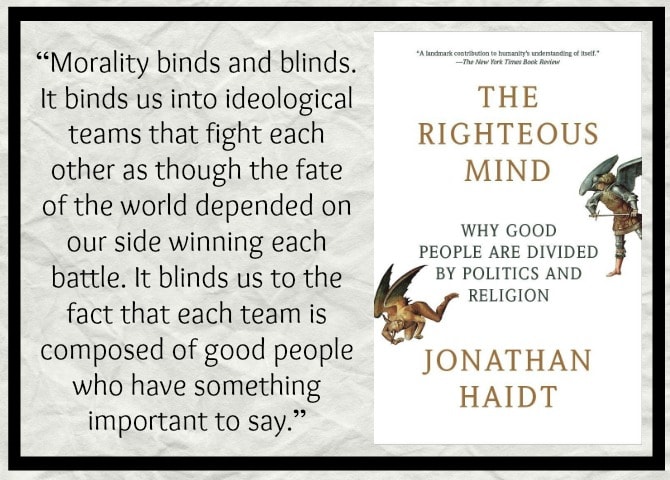
What a Difference a Mom Makes: The Indelible Imprint a Mom Leaves on Her Son’s Life, by Dr. Kevin Leman: From the moment I found out I was pregnant with Charleston, I just knew I was having a boy. And while part of me was nervous about the prospect of raising a son, I was excited too. Life with a little boy has been far better than I could have dreamed! As Charleston has gotten older, I’ve begun to recognize the difference between my own experience as a Boy Mom and that of my friends who are moms to daughters. Boys have a different bond with their moms, and different needs—which was why I was excited to read this book specifically directed to mothers of sons.
In What a Difference a Mom Makes, Dr. Leman walks mothers through the psychology and behavioral makeup of boys, helping us understand how they are different from us and how we can make the biggest impact in their young lives. He addresses challenges specific to every stage, from infancy through high school, and helps moms understand what’s going on with our sons and what they need from us. The book does contain quite a bit of information that pertains to all parents of boys and girls (such as discipline strategies, the role birth order plays in personality, and parenting styles), but all of it is told with the specific mother/son dynamic in mind.
This book provided me with some useful tools and important ideas to consider with Charleston. I especially appreciated the emphasis on a mom’s crucial role in her son’s future romantic life, and liked Dr. Leman’s suggestions for how to discuss gender roles and sexuality with our boys. (It was helpful for me to hear that moms can and should discuss sex with their sons—this isn’t just Dad’s job!) I also liked the anecdotes sprinkled throughout the book describing Mother/Son success stories and how moms have handled various parenting challenges. And I loved the big-picture perspective, focusing on the young men we hope our boys will become and how we intend to get them there; Dr. Leman reminds moms that parenting in the earliest years sets the stage for healthy manhood, and this was a great reminder for me to keep the end in mind.
Dr. Leman’s attitude is no-nonsense and a bit harsher than I’m usually comfortable with, though it was not unexpected since I’ve heard him on several Focus on the Family interviews and have come to realize his tone is intended to be humorous, even when it doesn’t always come across that way. I’m also not fully on board with some of his generalizations regarding the minds and personalities of men and women, and I struggled with his outdated attitudes towards women and gender roles. (For the record, I am saying this as a full-time Stay-At-Home Mom in a family that adheres to stereotypical gender norms; however, I realize this model doesn’t work for all families and can see how Dr. Leman’s opinions on this matter could be offensive to many moms.)
This wasn’t my favorite parenting book, but I still found it to be a beneficial read. I came away feeling empowered in my role as Charleston’s mom and more excited than ever to be raising a young man.
My Rating: 3.5 Stars
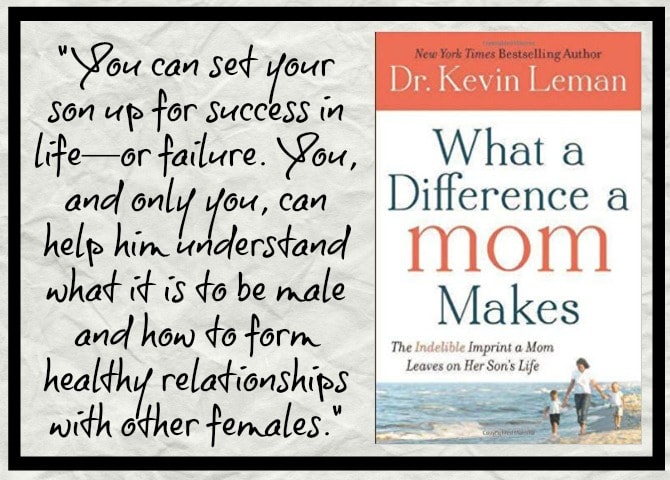
Finding God in the Waves: How I Lost My Faith and Found It Again Through Science, by Mike McHargue: Mike McHargue—better known as Science Mike, and cohost of The Liturgists Podcast—describes himself as a Christian turned atheist turned follower of Jesus. How’s that for a testimony? Mike grew up in the evangelical church and was all-in with his faith. As he grew older, and studied more of the Bible, he began to have questions. What the Bible said to be true of God didn’t seem to line up with science or his own life experiences.
Over time, Mike became a secret atheist while still masquerading as a Christian. His children, the members of the church where he served as an elder, and even his wife had no idea that Mike had abandoned God. Years into this duplicitous life, Mike was standing on the shores of the Pacific Ocean when a mystical experience caused him to rethink his stance. This time, it wasn’t theology or Scripture that led Mike back to God, but science.
As a memoir, this book is fascinating. Mike is an empathetic narrator whose pursuit of truth and integrity are beautiful and inspiring. I loved seeing how God got Mike’s attention through both mysticism AND science—two realms that rarely intersect—and I appreciated Mike’s scientific insights on faith and God, such as what brain scans reflect about our prayer life and how God is revealed in nature. Many of the insights in this book reflect ideas presented in The Righteous Mind, which I had listened to immediately before reading this book, and it was interesting to compare the information as it was shared from sources who differ in their stance on God.
Unfortunately, I could not get behind Mike’s theological conclusions. While Mike is no longer the staunch atheist he once was, his stated beliefs are far from those espoused by Christ and held by members of the Christian faith. Mike dismisses the power of prayer, denies the deity of Christ, and does not believe in the Resurrection. I have read many memoirs recently by individuals who waiver in their faith, and I believe such doubts are understandable and even expected; however, our doubts don’t give us the liberty to create a new God that fits within a mold of our own making. God is who He says He is, whether we are comfortable with that or not. And Mike’s flagrant denial of so many Gospel Truths—while also proclaiming to be a Christian—is troubling. Our God is one who cannot be confined to the laws of science, and Mike’s attempts to put God in this box is dishonoring to our Creator and cheapens the faith of Christ’s followers.
For anyone struggling to reconcile faith and science, this book may be a helpful stepping stone on the way to discovering the Truth. Mike is honoring of the Church and of all of humanity, and his message of acceptance is one that many need to hear. However, for committed Christians like myself, this book has the potential to plant seeds of doubt and confusion. Like The Liturgists Podcast (which I no longer listen to), it may be culturally relevant but is far from theologically sound.
My Rating: 3 Stars
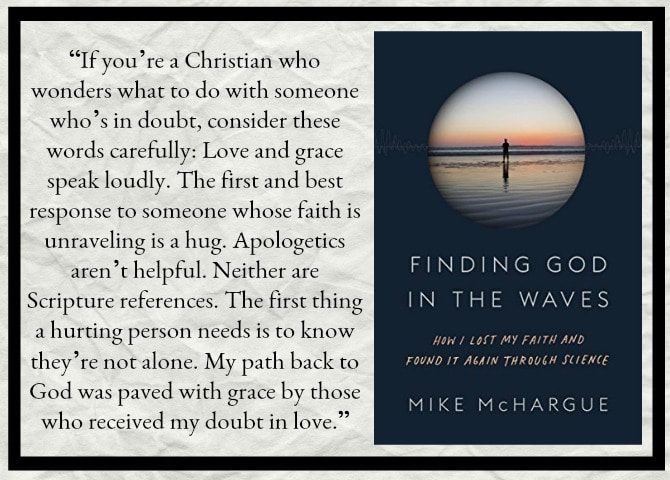
Kingdom of the Blind, by Louise Penny: In this most recent installment of the beloved Three Pines series, Chief Inspector Gamache (currently on suspension from his position as head of the Sûreté du Québec) receives an ominous invitation to an abandoned farmhouse, where he discovers he’s been named one of the executors of a will for a woman he’s never met. Gamache accepts the role that leads to an amateur investigation of the mysterious woman and the inheritance she claims was hers to bequeath. As the puzzle unfolds, Gamache and his fellow executors become acquainted with the deceased woman’s eccentric family, one of whom is promptly murdered.
Meanwhile, Gamache himself is still under investigation for his involvement in an opioid sting operation six months earlier. With his character, reputation, and relationships on the line, Gamache does all he can to save himself and the lives of countless young Canadians whose lives have been jeopardized by the release of a deadly narcotic.
While I still adore the Three Pines novels, and particularly the character of Inspector Gamache, this wasn’t my favorite in the series. The writing is wonderful and insightful, the lovable yet kooky cast of characters is present, and I liked seeing more development within the multi-novel story arc. But this book’s primary mystery didn’t draw me in the way many of the others have. And I missed the psychological probing and emotional depth featured in the series’ better installments. I haven’t lost faith in Louise Penny, but I’m hoping for a little more action and some more complex themes in the next book.
My Rating: 3.5 Stars
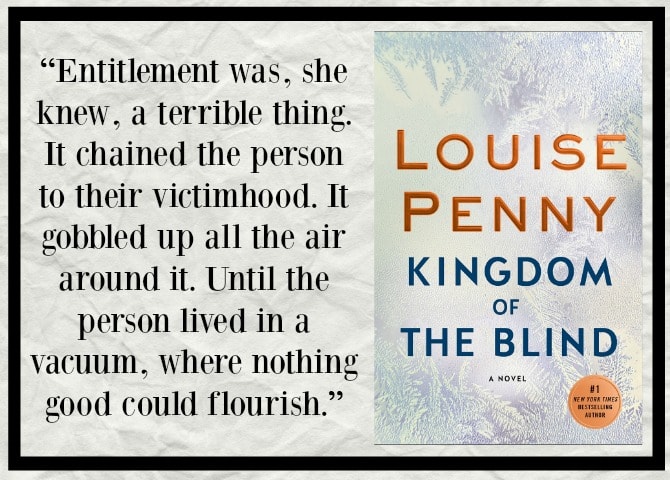
After Anna, by Lisa Scottoline: Seventeen years ago, Maggie’s life came crashing down around her when her husband left her and gained custody of their six-month-old daughter, Anna. Maggie has finally gotten her second chance at marriage and motherhood with Dr. Noah Alderman and his ten-year-old son, Caleb. The family is happy and complete—until Maggie receives a call from the daughter she thought she’d lost forever. Noah and Maggie eagerly welcome Anna into their home and their lives, unprepared for the devastation she is about to bring to their family.
The story is told in alternating chapters: half from Maggie’s perspective before Anna is killed, and half from Noah’s perspective afterwards as he sits on trial for Anna’s murder. Suspense builds as we begin to piece together what happened and how things went so wrong.
This is only the second book I’ve read from Lisa Scottoline, and from my limited experience I have to say that Scottoline has mastered the art of the page-turner. I stayed up way past my bedtime to finish this one because I was dying to find out what was happening. Like the other Scottline novel I read, this one has very little swearing or gratuitous sex or gore (which I appreciated) and explores the unique challenges and emotions of parenting adolescents. There are also some great plot twists that I never saw coming.
To be clear, this is not great literature. The prose is neither beautiful nor insightful, and the dialogue is awkward and unrealistic. There are also a couple of storylines that felt out of place and were a bit too over the top to be believable. Still, this was a great “fluff” read to break up some of the heavier books I’ve been reading lately, and I have a feeling Scottoline will be one of my go-to authors in the future.
My Rating: 3.5 Stars
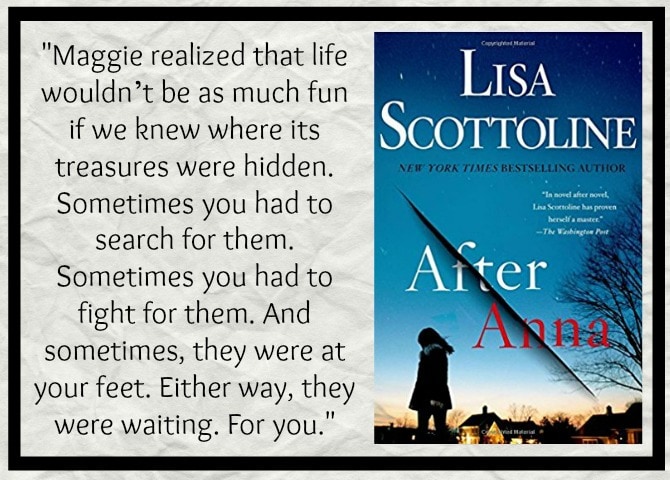
Have you read any of these books? I’d love to know your thoughts! I’ll have Part Two of March’s Quick Lit for you next Wednesday; get your TBRs ready, because I have some AMAZING books to share with you!